Festivalsandholidays传统节日和假日
- 格式:pdf
- 大小:471.19 KB
- 文档页数:3
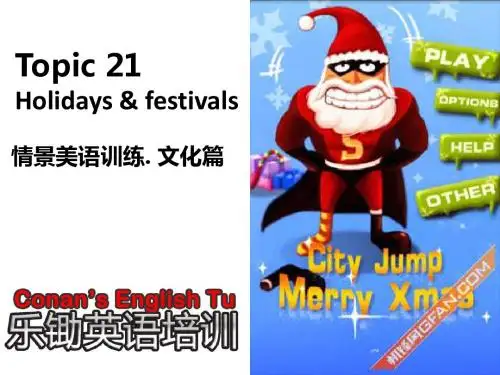
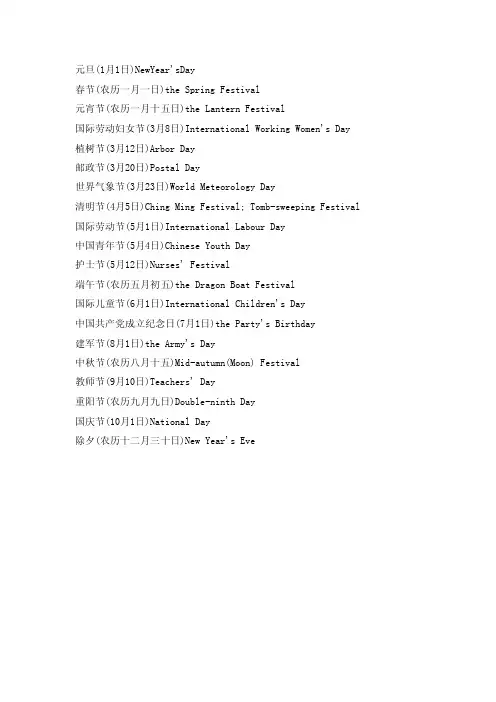
元旦(1月1日)NewYear'sDay春节(农历一月一日)the Spring Festival元宵节(农历一月十五日)the Lantern Festival国际劳动妇女节(3月8日)International Working Women's Day 植树节(3月12日)Arbor Day邮政节(3月20日)Postal Day世界气象节(3月23日)World Meteorology Day清明节(4月5日)Ching Ming Festival; Tomb-sweeping Festival 国际劳动节(5月1日)International Labour Day中国青年节(5月4日)Chinese Youth Day护士节(5月12日)Nurses' Festival端午节(农历五月初五)the Dragon Boat Festival国际儿童节(6月1日)International Children's Day中国共产党成立纪念日(7月1日)the Party's Birthday建军节(8月1日)the Army's Day中秋节(农历八月十五)Mid-autumn(Moon) Festival教师节(9月10日)Teachers' Day重阳节(农历九月九日)Double-ninth Day国庆节(10月1日)National Day除夕(农历十二月三十日)New Year's Eve1.Christmas 圣诞节每年12月25日,是基督教创始人耶稣的诞辰,也是基督徒最大的节日-圣诞节December 25th is Christmas Day on which Jesus Christ was born.It is the biggest day for the Christians.2.Valentine's Day 情人节在西方的一些国家中,有一个极富浪漫色彩,最受情侣们欢迎的节日,这就是每年2月14 句型的情人节。
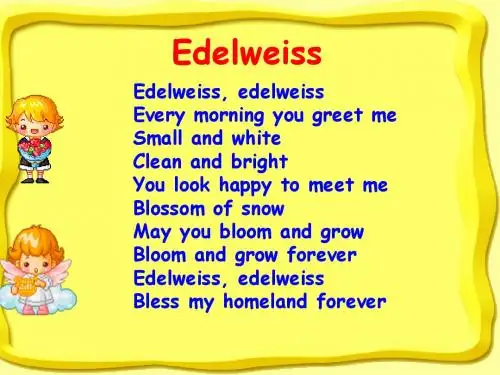
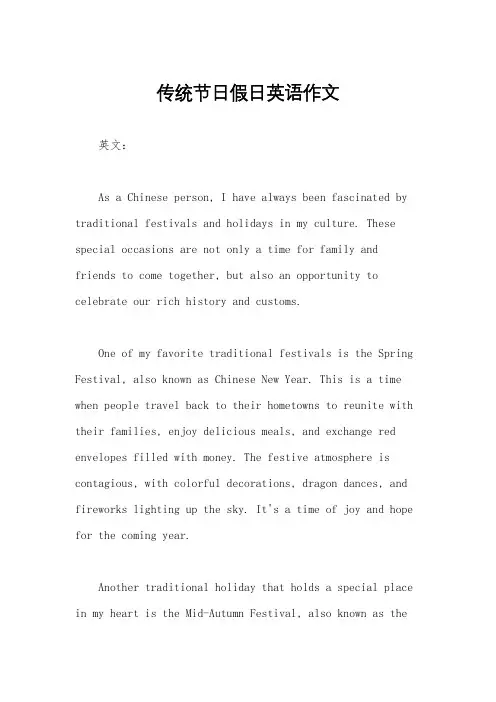
传统节日假日英语作文英文:As a Chinese person, I have always been fascinated by traditional festivals and holidays in my culture. These special occasions are not only a time for family and friends to come together, but also an opportunity to celebrate our rich history and customs.One of my favorite traditional festivals is the Spring Festival, also known as Chinese New Year. This is a time when people travel back to their hometowns to reunite with their families, enjoy delicious meals, and exchange red envelopes filled with money. The festive atmosphere is contagious, with colorful decorations, dragon dances, and fireworks lighting up the sky. It's a time of joy and hope for the coming year.Another traditional holiday that holds a special place in my heart is the Mid-Autumn Festival, also known as theMoon Festival. This is a time for families to gather and give thanks for the harvest, while enjoying mooncakes and admiring the full moon. I have fond memories of sitting with my family, eating mooncakes, and watching the moon rise in the sky. It's a time of reflection and gratitude.中文:作为一个中国人,我一直对我们文化中的传统节日和假期充满着兴趣。

中西方传统节日的英语表达:中国传统节日:1.元旦1月1日 New Year's Day2.春节农历一月一日 Spring Festival;Chinese New Year's Day3.元宵节农历一月十五日 Lantern Festival4.妇女节3月8日 Women's Day5.清明节4月5日 Tomb-Sweeping Day6.劳动节5月1日 International Labor Day7.端午节农历五月初五 Dragon Boat Festival8.儿童节6月1日 International Children's Day9.七夕节农历七月初七Double Seventh Festival;Chinese Valentine's Day10.中秋节农历八月十五 Mid-Autumn MoonFestival11.重阳节农历九月九日 Double-ninth Day12.教师节9月10日 Teachers' Day13.国庆节10月1日 National Day14.除夕农历十二月三十日New Year's Eve西方传统节日:1.新年1月1日 New Year's Day2.情人节2月14日 Valentine's Day3.愚人节4月4日 April Fool′s Day4.复活节春分月圆后的第一个星期日3月21至4月25之间 Easter Day5.母亲节5月的第二个星期日 Mother's Day6.父亲节6月的第三个星期日 Father's Day7.万圣节11月1日 Halloween Day8.8.感恩节11月的第四个星期四 Thanksgiving Day9.9.平安夜12月24日 Christmas Eve10.圣诞节12月25日 Christmas Day。
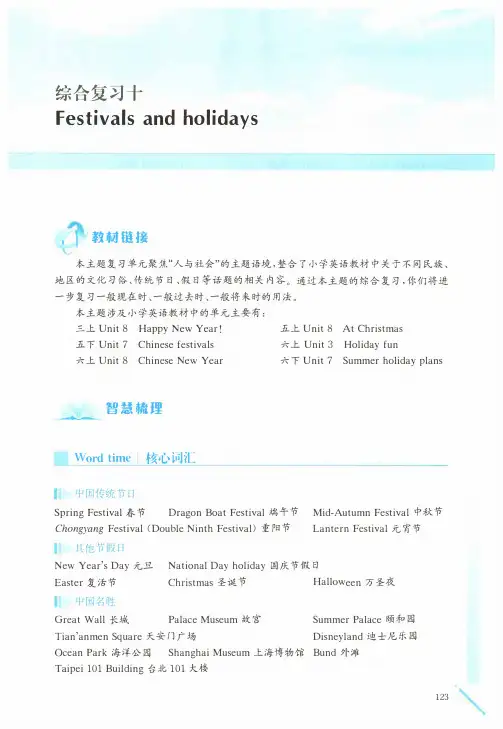
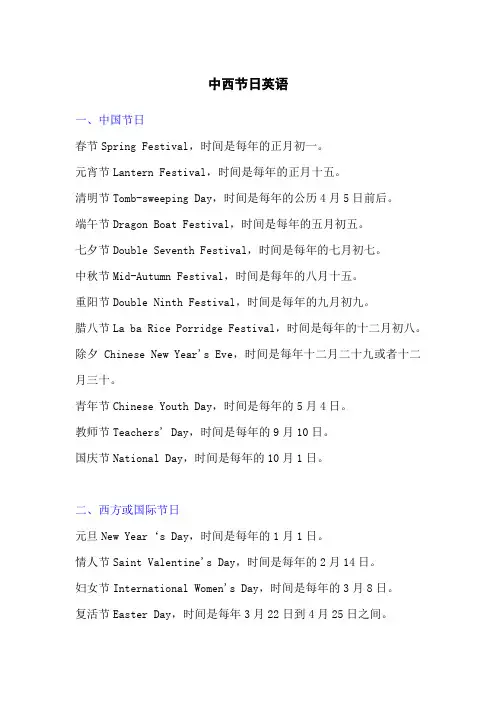
中西节日英语一、中国节日春节Spring Festival,时间是每年的正月初一。
元宵节Lantern Festival,时间是每年的正月十五。
清明节Tomb-sweeping Day,时间是每年的公历4月5日前后。
端午节Dragon Boat Festival,时间是每年的五月初五。
七夕节Double Seventh Festival,时间是每年的七月初七。
中秋节Mid-Autumn Festival,时间是每年的八月十五。
重阳节Double Ninth Festival,时间是每年的九月初九。
腊八节La ba Rice Porridge Festival,时间是每年的十二月初八。
除夕Chinese New Year's Eve,时间是每年十二月二十九或者十二月三十。
青年节Chinese Youth Day,时间是每年的5月4日。
教师节Teachers' Day,时间是每年的9月10日。
国庆节National Day,时间是每年的10月1日。
二、西方或国际节日元旦New Year‘s Day,时间是每年的1月1日。
情人节Saint Valentine's Day,时间是每年的2月14日。
妇女节International Women's Day,时间是每年的3月8日。
复活节Easter Day,时间是每年3月22日到4月25日之间。
愚人节April Fool's Day,时间是每年的4月1日。
劳动节International Workers' Day或者May Day、Labor Day,时间是每年的5月1日。
母亲节Mother's Day,时间是每年5月的第二个星期日。
儿童节International Children's Day,时间是每年的6月1日。
父亲节Father's Day,时间是每年6月的第三个星期日。
万圣节Halloween,时间是每年的10月31日。
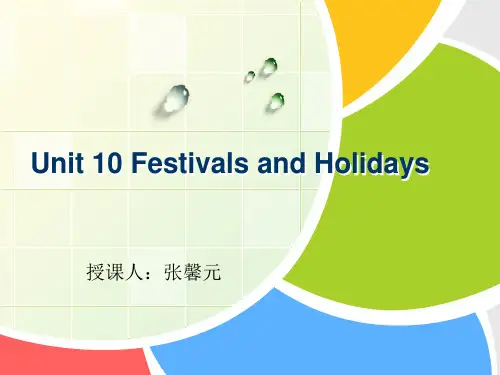
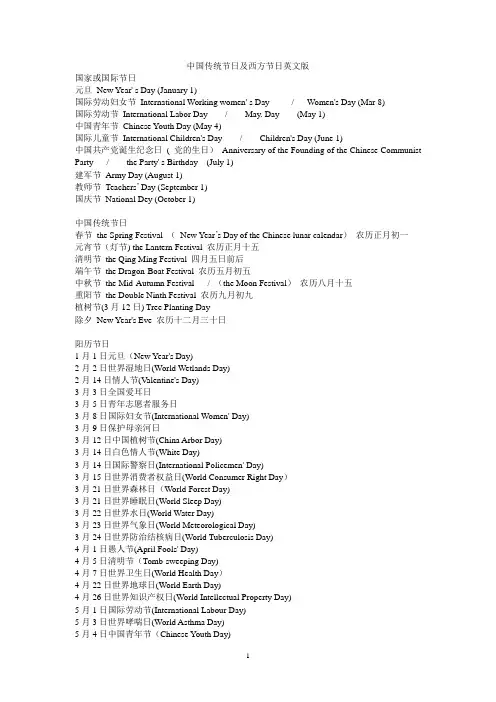
中国传统节日及西方节日英文版国家或国际节日元旦New Year' s Day (January 1)国际劳动妇女节International Working women' s Day / Women's Day (Mar 8)国际劳动节International Labor Day / May. Day (May 1)中国青年节Chinese Youth Day (May 4)国际儿童节International Children's Day / Children's Day (June 1)中国共产党诞生纪念日( 党的生日)Anniversary of the Founding of the Chinese Communist Party / the Party' s Birthday (July 1)建军节Army Day (August 1)教师节Teachers’ Day (September 1)国庆节National Dey (October 1)中国传统节日春节the Spring Festival (New Year’s Day of the Chinese lunar calendar)农历正月初一元宵节(灯节) the Lantern Festival 农历正月十五清明节the Qing Ming Festival 四月五日前后端午节the Dragon-Boat Festival 农历五月初五中秋节the Mid-Autumn Festival / (the Moon Festival)农历八月十五重阳节the Double Ninth Festival 农历九月初九植树节(3月12日) Tree Planting Day除夕New Year's Eve 农历十二月三十日阳历节日1月1日元旦(New Year's Day)2月2日世界湿地日(World Wetlands Day)2月14日情人节(Valentine's Day)3月3日全国爱耳日3月5日青年志愿者服务日3月8日国际妇女节(International Women' Day)3月9日保护母亲河日3月12日中国植树节(China Arbor Day)3月14日白色情人节(White Day)3月14日国际警察日(International Policemen' Day)3月15日世界消费者权益日(World Consumer Right Day)3月21日世界森林日(World Forest Day)3月21日世界睡眠日(World Sleep Day)3月22日世界水日(World Water Day)3月23日世界气象日(World Meteorological Day)3月24日世界防治结核病日(World Tuberculosis Day)4月1日愚人节(April Fools' Day)4月5日清明节(Tomb-sweeping Day)4月7日世界卫生日(World Health Day)4月22日世界地球日(World Earth Day)4月26日世界知识产权日(World Intellectual Property Day)5月1日国际劳动节(International Labour Day)5月3日世界哮喘日(World Asthma Day)5月4日中国青年节(Chinese Youth Day)5月8日世界红十字日(World Red-Cross Day)5月12日国际护士节(International Nurse Day)5月15日国际家庭日(International Family Day)5月17日世界电信日(World Telecommunications Day)5月20日全国学生营养日5月23日国际牛奶日(International Milk Day)5月31日世界无烟日(World No-Smoking Day)6月1日国际儿童节(International Children's Day)6月5日世界环境日(International Environment Day)6月6日全国爱眼日6月17日世界防治荒漠化和干旱日(World Day to combat desertification)6月23日国际奥林匹克日(International Olympic Day)6月25日全国土地日6月26日国际禁毒日(International Day Against Drug Abuse and Illicit Trafficking)7月1日中国共产党诞生日(Anniversary of the Founding of the Chinese Communist Party) 7月1日国际建筑日(International Architecture Day)7月7日中国人民抗日战争纪念日7月11日世界人口日(World Population Day)8月1日中国人民解放军建军节(Army Day)8月12日国际青年节(International Youth Day)9月8日国际扫盲日(International Anti-illiteracy Day)9月10日中国教师节(Teacher's Day)9月16日中国脑健康日9月16日国际臭氧层保护日(International Day for the Preservation of the Ozone Layer)9月20日全国爱牙日9月21日世界停火日(World Cease-fire Day)9月27日世界旅游日(World Tourism Day)10月1日中华人民共和国国庆节(National Day)10月1日国际音乐日(International Music Day)10月1日国际老年人日(International Day of Older Persons)10月4日世界动物日(World Animal Day)10月5日世界教师日(World Teachers' Day)(联合国教科文组织确立)10月8日全国高血压日10月9日世界邮政日(World Post Day)10月10日世界精神卫生日(World Mental Health Day)10月14日世界标准日(World Standards Day)10月15日国际盲人节(International Day of the Blind)10月15日世界农村妇女日(World Rural Women's Day)10月16日世界粮食日(World Food Day)10月17日国际消除贫困日(International Day for the Eradication of Poverty)10月24日联合国日(United Nations Day)10月24日世界发展新闻日(World Development Information Day)10月28日中国男性健康日10月29日国际生物多样性日(International Biodiversity Day)10月31日万圣节(Halloween)11月8日中国记者节11月9日消防宣传日11月14日世界糖尿病日(World Diabetes Day)11月17日国际大学生节11月25日国际消除对妇女的暴力日(International Day For the elimination of Violence against Women)12月1日世界爱滋病日(World AIDS Day)12月3日世界残疾人日(World Disabled Day)12月4日全国法制宣传日12月9日世界足球日(World Football Day)12月25日圣诞节(Christmas Day)12月29日国际生物多样性日(International Biological Diversity Day)1月最后一个星期日国际麻风节3月最后一个完整周的星期一中小学生安全教育日春分月圆后的第一个星期日复活节(Easter Monday)(有可能是3月22-4月25日间的任一天) 5月第二个星期日母亲节(Mother's Day)5月第三个星期日全国助残日6月第三个星期日父亲节(Father's Day)9月第三个星期二国际和平日(International Peace Day)9月第三个星期六全国国防教育日9月第四个星期日国际聋人节(International Day of the Deaf)10月的第一个星期一世界住房日(World Habitat Day)10月的第二个星斯一加拿大感恩节(Thanksgiving Day)10月第二个星期三国际减轻自然灾害日(International Day for Natural Disaster Reduction)10月第二个星期四世界爱眼日(World Sight Day)11月最后一个星期四美国感恩节(Thanksgiving Day)农历节日农历正月初一春节(the Spring Festival)农历正月十五元宵节(Lantern Festival)农历五月初五端午节(the Dragon-Boat Festival)农历七月初七乞巧节(中国情人节)(Double-Seventh Day)农历八月十五中秋节(the Mid-Autumn Festival)农历九月初九重阳节(the Double Ninth Festival)农历腊月初八腊八节(the laba Rice Porridge Festival)农历腊月二十四传统扫房日。
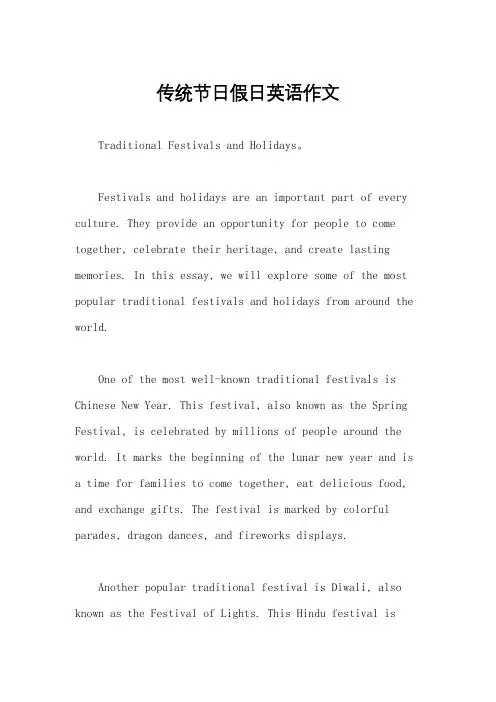
传统节日假日英语作文Traditional Festivals and Holidays。
Festivals and holidays are an important part of every culture. They provide an opportunity for people to come together, celebrate their heritage, and create lasting memories. In this essay, we will explore some of the most popular traditional festivals and holidays from around the world.One of the most well-known traditional festivals is Chinese New Year. This festival, also known as the Spring Festival, is celebrated by millions of people around the world. It marks the beginning of the lunar new year and is a time for families to come together, eat delicious food, and exchange gifts. The festival is marked by colorful parades, dragon dances, and fireworks displays.Another popular traditional festival is Diwali, also known as the Festival of Lights. This Hindu festival iscelebrated in India and other countries with large Hindu populations. During Diwali, people decorate their homeswith colorful lights, candles, and rangoli designs. Theyalso exchange gifts, eat delicious sweets, and set off fireworks to celebrate the victory of light over darkness.In Japan, one of the most important traditionalholidays is Obon. This Buddhist festival is held to honor the spirits of one's ancestors. During Obon, families visit their ancestral graves, clean and decorate them, and offer food and incense to their deceased loved ones. It is also a time for traditional dance performances, known as Bon Odori, and fireworks displays.In the United States, one of the most populartraditional holidays is Thanksgiving. This holiday, whichis celebrated on the fourth Thursday of November, is a time for families and friends to come together and give thanksfor the blessings in their lives. The day is marked by a traditional feast, which typically includes turkey, stuffing, cranberry sauce, and pumpkin pie.In conclusion, traditional festivals and holidays play an important role in preserving cultural heritage and bringing people together. Whether it is Chinese New Year in China, Diwali in India, Obon in Japan, or Thanksgiving in the United States, these celebrations provide an opportunity for people to connect with their roots, create lasting memories, and strengthen their sense of community.。
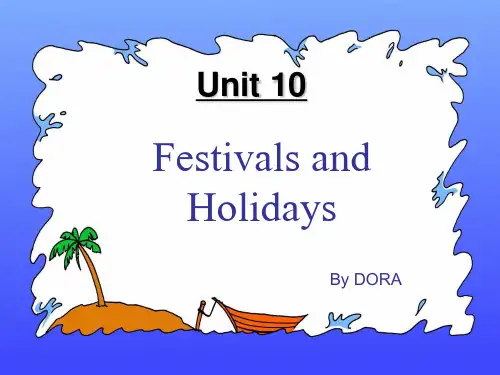
UNIT 2 FESTIVALS AND HOLIDAYSCONTENTSPART I WARMING UP (1)PART II LISTENING AND SPEAKING (2)PART III READING (6)Words & Expressions (7)Word Study (10)Text Analysis (12)Beyond the text (14)PART IV GRAMMAR FOCUS (17)PART V WRITING (18)PART VI VIEWING (20)PART VII THE PRIDE OF CHINA (23)PART I WARMING UP Task教学目标:旨在引导学生简单介绍几个中外常见节日。
时间分配:10分钟教学步骤:1.学生了解任务要求,并用一句话介绍节日;2.学生与同伴互换答案并讨论;3.启发学生讨论节日由来以及庆祝方式。
Suggested answersPART II LISTENING AND SPEAKINGTask 1教学目标:旨在训练和提高学生的听力理解和信息速记的能力。
时间分配:10 分钟教学步骤:1. 学生了解练习的具体要求,迅速浏览练习内容;2. 教师针对听力材料中的生词和难词进行讲解;3. 放第一遍录音,学生边听边做笔记;3. 放第二遍录音,学生答题;4. 检查和点评学生答题情况。
ScriptA: How did you celebrate New Year’s Day, Shirley?B: I went back to my hometown and had a joyful family reunion.A: How will you spend your summer vacation, staying at home or going on a trip, Peter?B: I prefer staying at home because most places are overcrowded with people.A: Hi, Mike. How was your holiday?B: It was terrific! I went to Sanya with a close friend.A: Did you enjoy your vacation, Jack?B: Absolutely! I’m feeling relaxed and refreshed right now.A: What did your family do during the holiday, Judy?B: My parents went fishing while I went hiking.Task 2教学目标:旨在训练学生捕捉信息、速记要点的能力,并通过角色扮演练习口头表达。
节日和假日英文作文英文:Festivals and holidays are important parts of our lives. They bring us joy, happiness, and a sense of community. In this article, I will discuss my favorite festival and holiday, and explain why they are important to me.My favorite festival is Christmas. It is a time when families come together and celebrate the birth of Jesus Christ. We decorate our homes with lights and ornaments, exchange gifts, and enjoy delicious food. The atmosphere is always warm and festive, and I love the feeling of being surrounded by loved ones.Another holiday that I cherish is Thanksgiving. It is a time to give thanks for all the blessings in our lives. We gather with family and friends, share a meal, and reflecton the things we are grateful for. I appreciate thesimplicity of this holiday and the focus on gratitude.中文:节日和假日是我们生活中重要的组成部分。
节假日传统节日的作文英文回答:Festivals and holidays are an integral part of every culture, and they bring people together to celebrate and enjoy special occasions. In my country, China, we have a rich tradition of festivals and holidays that are deeply rooted in our history and customs.One of the most important traditional festivals in China is the Spring Festival, also known as Chinese New Year. It is celebrated on the first day of the lunar calendar and lasts for 15 days. During this time, families gather together to have a reunion dinner, exchange gifts, and set off fireworks. It is believed that by doing so, we can ward off evil spirits and bring good luck for the upcoming year. The streets are decorated with red lanterns and people wear traditional clothes, such as the qipao and the hanfu, to celebrate the festival.Another significant festival is the Mid-Autumn Festival, which falls on the 15th day of the eighth lunar month. Itis a time for family members to get together and appreciate the full moon while eating mooncakes, a traditional delicacy. The festival is also associated with the legendof Chang'e, the moon goddess, and the story of Houyi, the archer. People often exchange mooncakes as a symbol ofunity and harmony.Apart from these traditional festivals, there are also modern holidays that have become popular in China, such as Christmas and Valentine's Day. These holidays are often celebrated by young people and are seen as an opportunityto express love and affection towards their loved ones.They exchange gifts, go out for romantic dinners, and enjoy the festive atmosphere.中文回答:节日和假期是每个文化的重要组成部分,它们将人们聚集在一起,共同庆祝和享受特殊的时刻。
初中英语作文节日与假期Title: Festivals and Holidays in Middle School。
Introduction:In middle school, students enjoy a variety of festivals and holidays throughout the academic year. These occasions provide a break from the daily routine of classes and homework, allowing students to relax and celebrate with their friends and family. In this article, we will explore some of the most important festivals and holidays celebrated in middle school, highlighting theirsignificance and the activities that take place during these special times.1. Spring Festival:The Spring Festival, also known as Chinese New Year, is the most important traditional festival in China. It usually falls between late January and mid-February. Duringthis time, students have a long winter vacation, which allows them to spend quality time with their families. The Spring Festival is marked by various customs and traditions, such as decorating homes with red lanterns, giving and receiving red envelopes with money, and setting off firecrackers. Students often participate in cultural activities, such as dragon and lion dances, and learn about traditional Chinese customs and folklore.2. Mid-Autumn Festival:The Mid-Autumn Festival, also called the Moon Festival, is celebrated on the 15th day of the eighth lunar month, usually in September or October. This festival is known for its iconic mooncakes, which are round pastries filled with sweet fillings like lotus seed paste or red bean paste. During this holiday, students gather with their families to appreciate the full moon and enjoy delicious mooncakes. Lantern parades and performances are also common duringthis time, adding to the festive atmosphere.3. National Day:National Day is celebrated on October 1st in China, marking the founding of the People's Republic of China.This holiday is a time for students to reflect on their country's history and achievements. Many schools organize flag-raising ceremonies and patriotic activities to instill a sense of national pride among students. Additionally,this week-long holiday provides an opportunity for students to travel with their families and explore different partsof the country.4. Christmas:Although Christmas is not a traditional Chinese holiday, it has gained popularity among middle school students in recent years. Many schools organize Christmas parties and activities, where students exchange gifts, sing carols, and decorate Christmas trees. It is also common for students to participate in charity events during this time, spreading the spirit of giving and compassion.5. New Year's Day:New Year's Day, celebrated on January 1st, marks the beginning of the Gregorian calendar year. This holiday is often associated with making resolutions and setting goals for the coming year. In schools, students may engage in various activities such as writing New Year's resolutions, reflecting on their achievements from the previous year,and setting academic goals for the upcoming semester. It is a time of reflection, renewal, and anticipation for the future.6. Dragon Boat Festival:The Dragon Boat Festival, also known as Duanwu Festival, is celebrated on the fifth day of the fifth lunar month, usually falling in June. This festival commemorates the ancient poet Qu Yuan and involves dragon boat races, eating sticky rice dumplings called zongzi, and hanging up pouches of herbs to ward off evil spirits. Many schools organize dragon boat races and encourage students to participate in these traditional events, fostering teamwork and cultural appreciation.Conclusion:Festivals and holidays in middle school provide students with opportunities to learn about their cultural heritage, spend quality time with loved ones, and engage in various activities that promote personal growth and social connections. These celebrations not only break the monotony of academic life but also contribute to students' holistic development. By embracing and celebrating these festivals, students gain a deeper understanding of their cultural identity and build cherished memories that will last a lifetime.。
Festivals and holidays 传统节日和假日FestivalsAll the traditional festivals are based on the Chinese lunar calendar which has about 20 to 30 days difference from the international calendar. You will be fortunate if you come to China during one of these festivals, as you will get a glimpse of the traditional Chinese culture, values, and customs.1. Spring FestivalThis is the Chinese New Year in the lunar calendar, usually falling in early February. It is the most important festival in China and for Chinese communities in other countries. Like Christmas Day in the West, this festival is a family celebration where the whole family gathers together for festivities. On New Year’s Eve, the whole family sits around tables to have a grand feast and let off fireworks (nowadays fireworks are forbidden in many large cities to prevent fire and injury). The whole celebration will last until the Lantern Festival.2. Lantern FestivalOn the 15th day of the 1st month of the lunar calendar, normally falling at the end of February. During Latern Festival, people traditionally go outdoors to look at various lanterns in the streets or parks and eat round, sweet, rice-flour dumplings.3. Qingming FestivalNormally this falls on April 5, and is a festival to remember the deceased. On this day, people traditionally go to visit the tombs of their ancestors. If you are in Beijing at this time, you will see school children lay wreaths of flowers before the monument in Tian’anmen Square in memory of martyrs who died in the wars.4. Dragon Boat FestivalAlso known as Duanwu Festival, is a festival to remember the patriotic poet Qu Yuan who drowned himself in the river in 278 B.C. to oppose the rule of the Qin conqueror. Traditionally people rowed dragon boats on the 传统节日所有的中国传统节日都是基于中国阴历来算的。
中国阴历与国际日历相差20到30天。
如果您有幸在这些传统节日期间到中国来,那么可以体验到中国的传统文化、价值观和风俗。
1. 春节春节是中国的农历新年,通常在阳历二月上旬,是中国民间和世界各国华人社区最隆重的一个传统节日。
像西方的圣诞节,春节是一个全家团圆,举家欢庆的节日。
在除夕夜,家家户户都会团聚在一起吃团年饭,放烟花爆竹(现在中国很多大城市已经禁止春节放烟花爆竹,以防止火灾和伤害)。
春节的整个庆祝活动将持续到元宵节。
2. 元宵节元宵节是每年的农历正月十五日,通常在阳历的二月下旬。
按照中国民间传统,这天人们通常会吃元宵,外出赏花灯。
3. 清明节清明节通常是在阳历的4月5日,是祭祖和扫墓的日子。
这一天如果你在北京,你会看到学校的孩子们到天安门广场的人民英雄纪念碑前敬献花圈,纪念在战争中牺牲的烈士。
4. 端午节端午节又叫龙舟节,纪念公元前278年为反对秦国入侵而自沉的伟大爱国诗人屈原。
按照中国民间传统,人们通常会在端午节这天划龙舟,包粽子。
相传人们在这天包粽子并把粽子扔入河中喂鱼,希望鱼吃饱以river and dropped rice dumplings into the water to feed the fish, in the hope that the fish would not eat Qu Yuan’s body.5. Qixi FestivalFalling on the 7th day of the 7th month of the lunar calendar, the Qixi Festival is also known as Chinese Valentine’s Day or Double Seventh Festival. This is the most romantic Chinese traditional festival and there’s a romantic love legend about a herd boy (Niu Lang) and a fairy weaver girl (Zhi Nv). After facing opposition to their true love, they are eventually allowed by the Jade Emperor to meet once each year on the 7th of the 7th lunar month. Traditionally, it is quite different from the western Valentine’s Day and is a festival mainly for girls. There is not so much emphasis on giving chocolates, flowers, and kisses. Instead, Chinese girls would prepare fruits, melons, and incense to pray for romantic love and a happy marriage.6. Mid-Autumn FestivalDuring this festival, families gather together to have a feast and eat moon cakes while watching the full moon in the sky. The moon cake symbolizes family reunion because of its round shape. It is usually made of wheat flour with fillings of various flavors, very tasty if you have a sweet tooth.7. Chongyang FestivalThis is a festival for elderly people on the 9th day of the 9th month of the lunar calendar, usually falling in October. According to theyin/yang dichotomy that forms the basis of the ancient Chinese worldview, yin represents the elements of darkness and yang represents life and brightness. The number nine is regarded as yang, hence the name “Chongyang Festival” (“Chong” means “repeat” in Chinese). The ninth month also heralds the approach of winter. It is a time when the living need warm clothing, and filial Chinese sons and daughters extended this to make the festival a time for providing winter clothes for their ancestors. In addition, people customarily climb mountains, appreciate chrysanthemum flowers, and drink chrysanthemum wine.8. Winter Solstice FestivalWinter solstice is one of the 24 solar terms in the Chinese lunar calendar and it’s the 后不再去咬屈原的身体。
5. 七夕节七夕节是中国的情人节,在每年的农历七月初七。
这是中国传统节日中最具浪漫色彩的一个节日,源于牛郎和织女的浪漫爱情传说。
与西方的情人节不同,在中国七夕节主要是女孩的节日,并不像西方情人节那样强调送花和巧克力,中国古代的女孩子们通常会在这一天摆上时令瓜果,焚香祈祷,乞求浪漫的爱情和美满的姻缘。